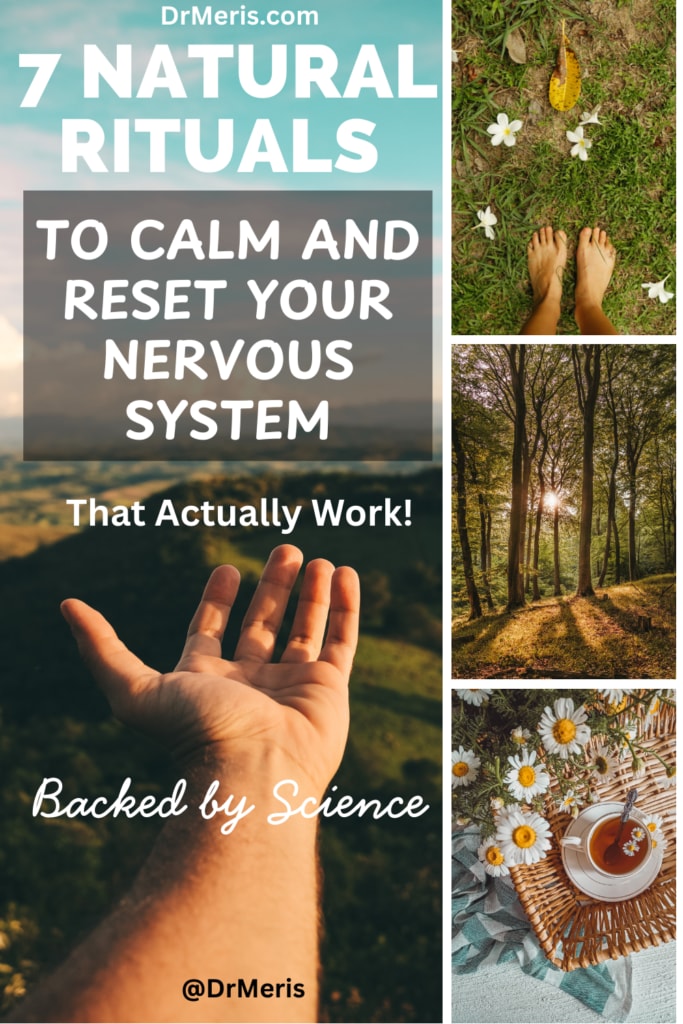Natural rituals to calm your nervous system are simple yet can be effective. If you’re feeling wired, overwhelmed, or just… not yourself, it could be a sign that your nervous system is out of balance.
When your body gets stuck in fight-or-flight mode, it’s not just in your head — it’s in your breath, your heartbeat, your digestion, your sleep. It’s your nervous system waving a flag and asking for a little help.
The good news? Nature’s been offering us that help all along. Below are seven gentle, research-backed rituals that don’t require fancy gear or a lifestyle overhaul. Just simple, natural practices that give your nervous system what it craves most: rhythm, rest, and regulation.
Let’s take a deep breath… and begin.

More Readings:
Science-Backed Health Benefits of Houseplants
Do Houseplants Purify Indoor Air?
Natural Rituals
Grounding (Earthing)
You know that feeling when your bare feet hit the grass or sand, and something inside you goes ahh?
That’s not just nostalgia — it’s biology. When you make skin contact with the Earth, you’re literally exchanging energy with it. Studies show that grounding can lower inflammation, balance cortisol (your stress hormone), and improve sleep quality.
Try this: kick off your shoes and stand in your yard, or lay on a picnic blanket at the park. Just 10 minutes. No phone. Just you and the Earth doing your thing.
Deep, Rhythmic Breathing in Nature
Your breath is always with you — and yet we rarely give it the attention it deserves. When you slow your breathing, you send a signal to your nervous system: we’re safe now.
One of the most effective ways to amplify this effect is to do it outdoors. Surrounded by the sounds and sights of nature, your body relaxes even more.
Try box breathing: inhale for 4 seconds, hold for 4, exhale for 4, hold for 4. Repeat 5 rounds. Feel the shift.
Cold Water Exposure
It sounds intense, I know — but hear me out. Cold water wakes up your vagus nerve, which plays a huge role in shifting your body out of stress mode. You don’t have to plunge into an icy lake (unless you want to). Even a splash of cold water on your face or a 30-second cold rinse at the end of your shower can work wonders.
Not only does it build stress resilience over time, it often leaves you feeling surprisingly refreshed and clear-headed.
Start small. Your nervous system will thank you.
Herbal Teas and Plant Infusions
There’s something magical about wrapping your hands around a warm mug of tea. But beyond the comfort, many herbs offer real support for your nervous system.
Lemon balm, for instance, can help calm anxious thoughts. Chamomile soothes both your belly and your mind. And tulsi (holy basil) has been used for centuries to help the body adapt to stress.
This isn’t about perfection. It’s about choosing a moment of calm in your day. So slow down. Brew your tea. Sip gently. Let it be your pause button.
Morning Sunlight Exposure
The first light of the day sets your entire biological rhythm. When you get sunlight in your eyes soon after waking — no sunglasses, no windows in the way — it tells your body it’s time to be awake, focused, and alive.
And as a bonus? It helps your body produce melatonin later, so you sleep better too.
Step outside with your coffee, walk your dog, stretch on your balcony — anything that gets you outdoors for 5–10 minutes. Even cloudy skies work.
Forest Bathing (Shinrin-Yoku)
This practice started in Japan and translates literally to “bathing in the forest air.” And no, it doesn’t involve water — just presence.
It’s about wandering slowly through trees or green spaces, letting your senses guide you. Smell the bark. Notice the shapes of leaves. Listen to birdsong.
This kind of nature immersion has been shown to lower blood pressure, reduce cortisol, and boost immune health. It’s like a nervous system massage… from trees.
Repetitive Rhythms
Ever notice how calming it is to sway gently? Or how babies are soothed by rocking or shushing?
That’s because rhythm regulates us. Our nervous system responds beautifully to repetition — especially when it’s gentle and soothing. Whether it’s a soft chant, a heartbeat-like drum, or even just swaying in your chair, these movements can restore a sense of safety and peace in your body.
If you’re feeling too frazzled to sit still, try starting here.
Final Thoughts: Healing Isn’t a Hack — It’s a Rhythm
Simple yet powerful, these natural rituals to calm your nervous system don’t require perfection — just presence. Whether you’re grounding in nature, breathing slowly, or sipping a calming tea, these practices create space for restoration.
Let’s be honest — most of us are doing the best we can. But if you’ve been running on fumes, constantly wired, or just off, your nervous system might be crying out for something slower. Gentler. More grounded.
You don’t need to overhaul your life. You don’t need to be fixed.
Start small. Try one of these natural rituals to calm your nervous system today — and then again tomorrow. Let it become part of your rhythm — something your body can count on.
Over time, those whispers of calm turn into real shifts. Deeper sleep. Clearer thinking. More resilience when life gets messy.
Because your body doesn’t just want to survive. It’s wired to heal — especially when you give it the space to do so.
References
- Chevalier, G., Sinatra, S.T., Oschman, J.L., Delany, R.M. and Brown, R., 2012. Earthing (grounding) the human body reduces blood viscosity—a major factor in cardiovascular disease. Journal of Alternative and Complementary Medicine, 18(2), pp.95–100. https://doi.org/10.1089/acm.2011.0820
- Brown, R.P. and Gerbarg, P.L., 2005. Sudarshan Kriya yogic breathing in the treatment of stress, anxiety, and depression: Part II—clinical applications and guidelines. Journal of Alternative and Complementary Medicine, 11(4), pp.711–717. https://doi.org/10.1089/acm.2005.11.711
- Kox, M., van Eijk, L.T., Zwaag, J., van den Wildenberg, J., Sweep, F.C., van der Hoeven, J.G. and Pickkers, P., 2014. Voluntary activation of the sympathetic nervous system and attenuation of the innate immune response in humans. Proceedings of the National Academy of Sciences, 111(20), pp.7379–7384. https://doi.org/10.1073/pnas.1322174111
- Kennedy, D.O., Scholey, A.B., Tildesley, N.T., Perry, E.K. and Wesnes, K.A., 2002. Modulation of mood and cognitive performance following acute administration of Melissa officinalis (lemon balm). Pharmacology, Biochemistry and Behavior, 72(4), pp.953–964. https://doi.org/10.1016/S0091-3057(02)00777-3
- Cohen, M.M., 2014. Tulsi – Ocimum sanctum: A herb for all reasons. Journal of Ayurveda and Integrative Medicine, 5(4), pp.251–259. https://doi.org/10.4103/0975-9476.146554
- LeGates, T.A., Fernandez, D.C. and Hattar, S., 2014. Light as a central modulator of circadian rhythms, sleep and affect. Nature Reviews Neuroscience, 15(7), pp.443–454. https://doi.org/10.1038/nrn3743
- Park, B.J., Tsunetsugu, Y., Kasetani, T., Kagawa, T. and Miyazaki, Y., 2010. The physiological effects of Shinrin-yoku (taking in the forest atmosphere or forest bathing): evidence from field experiments in 24 forests across Japan. Environmental Health and Preventive Medicine, 15(1), pp.18–26. https://doi.org/10.1007/s12199-009-0086-9
- Porges, S.W., 2011. The Polyvagal Theory: Neurophysiological Foundations of Emotions, Attachment, Communication, and Self-regulation. W. W. Norton & Company.
Sign Up for Our Email List
Get our latest articles, healthy recipes, tips, and exclusive deals delivered straight to your inbox with our newsletter.
We won't send you spam. Unsubscribe at any time.








